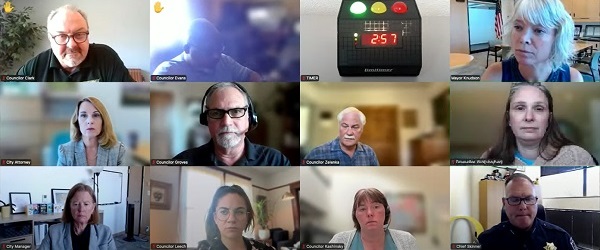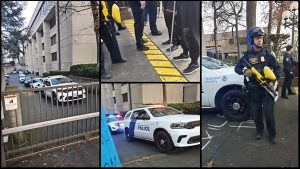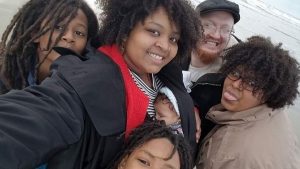Eugene considers panhandling ordinance
6 min read
Presenter: Eugene considers a panhandling ordinance similar to Springfield’s, which would let police cite the driver who passes food or money from a car to a person. With the City Council Sept. 17, Police Chief Chris Skinner:
Chris Skinner (Eugene Police, chief): I have had an opportunity to get to understand or better understand Springfield’s experience in this space from 2016 when their ordinance was passed. They underwent what we would typically undergo anytime we do anything new like this, which is a very comprehensive education campaign around why the ordinance is in place and what it’s designed to accomplish around community safety…
[00:00:38] And so what they’ve seen in Springfield is the ability to have a really good community campaign, good education. In the instances that an officer sees the ordinance being violated, that that stop is made that we’re able to, and they are able to change behavior with a simple conversation that doesn’t result in citation. And I think Springfield has enjoyed, at least from their perspective, has enjoyed a decrease in what they’ve seen around the unlawful transfer and some positive interactions with educating people about the new ordinance.
[00:01:07] Presenter: Councilor Mike Clark:
[00:01:09] Councilor Mike Clark: We just finished in our last meeting, I think, learning about the very, very in-depth community survey that was done. The general public in Eugene thinks that the most important issue that we can be dealing with is doing something about the unhoused. They think the city’s heading in the wrong direction and that we ought to trying some new things.
[00:01:31] And I support us trying this… We should at least be bringing new ideas of things that we might do to the community in such cases after such clear feedback from the community survey that we did. But for me this particular issue is most importantly is twofold.
[00:01:54] Number one: I’m in favor of it because handing money and other items out of the window of a moving car is a traffic safety issue as the chief has eloquently spoken to. We spend millions and millions of dollars trying to redesign the roadway and building them different in order to keep pedestrians and bicyclists separate from travel lanes, intentionally. And why we wouldn’t have an ordinance that says, Hey, it’s not a good idea to walk into a travel lane ever is beyond me.
[00:02:35] But on the second note, I don’t think there’s anything compassionate about the activity at all. It is the height of a lack of compassion to keep people trapped in the cycle of dependency.
[00:02:49] And I absolutely agree that there are all kinds of folks doing fantastic work in our community to help folks in need, and they should. But enabling people to stay stuck by giving the money out the window of a car seems like a really bad idea. And as I said, I don’t see anything compassionate about it at all.
[00:03:12] Presenter: Councilor Jennifer Yeh:
[00:03:14] Councilor Jennifer Yeh: Actually, I’m glad Councilor Clark talked about compassion because I think it’s a legitimate concern to bring up. Like, when we approach any situation, we need to approach it with empathy and we need to think about the complexities and the individual stories that folks that are experiencing homelessness are coming to us with. It’s not a monolith.
[00:03:37] And giving money to folks who are experiencing homelessness is a way for them to support their immediate needs.
[00:03:45] In fact, there is actually quite a bit of research out there on panhandling. This might be surprising to folks. There have been many research studies done on panhandling and the effects and ways to mitigate it and how people are actually using the money. And research shows that in the vast majority of cases, people are using it to address their immediate needs of food and shelter.
[00:04:07] There are certainly a percentage of the population of folks who are experiencing homelessness who have addiction issues. But it’s not everyone and it’s not even the majority of folks.
[00:04:17] I work in this industry so I see the data when I have to write grants every day and folks are struggling with lots of different things. But that doesn’t mean that someone gives them money, they’re using it to buy drugs. And that’s the conversation I’m often hearing in this community.
[00:04:32] We’re giving people a chance, if you choose to give people money, a chance to make a personal choice about their spending and address needs that might be very individual to them. And it offers dignity and control in their lives, which is something that folks who are living on the streets often do not have.
[00:04:48] The truth is there are long waiting lists in this community for folks who are anxious to get help, who are ready to make changes in their lives. They just need a little support to get off the street. And so the idea that giving someone five bucks or a bag of food from a restaurant is enabling their behaviors to just, and they don’t care and they don’t want to do anything, it’s just completely ridiculous and doesn’t stand up to the data in our community or the research that has done.
[00:05:19] I want to make clear that I am 100% here for a conversation about traffic safety. Our traffic safety is a serious issue and things are getting worse. You know, we have Vision Zero for a reason. Those things are important. And as someone who does a lot of walking in this community, I can’t even count the number of times I’ve almost been hit, and I’m not panhandling, I’m just walking. So the streets are dangerous and that is a legitimate concern,
[00:05:44] This data shows that pedestrian deaths are increasing. People are distracted, they’re on their phones, they’re not doing what they need to do. So I would be more than happy to have that conversation where we’re centering it around traffic safety.
[00:05:58] But picking out one tiny little thing from that conversation and pretending that we’re not trying to make ourselves more comfortable because we don’t want to see homeless people standing on a corner is not the solution to traffic safety.
[00:06:10] Because this seems to be very centered around doing something about the unhoused rather than doing something about traffic safety, and that makes me uncomfortable. I think the idea that this type of behavior is enabling someone is a misunderstanding about the folks in our community who are experiencing homelessness.
[00:06:30] And unless something new happens between now and our final conversation, I don’t think I could support this.
[00:06:38] Presenter: Eugene’s Mayor Kaarin Knudson:
[00:06:41] Kaarin Knudson (Eugene, mayor): Having lost Councilor Keating, I do not believe that the body is going to move forward with a motion or a vote today. I think this has been a robust discussion. When this comes back to Council, there will be a motion put forward and then an opportunity for any further discussion within that motion.
[00:06:58] Presenter: With Councilor Keating dropping out of the meeting after asking the others to delay the vote, the city manager said the Council would have to reschedule. Sarah Medary:
[00:07:09] Sarah Medary (Eugene, city manager): Your operating agreements allow a councilor to ask for a delay of a vote. And so that’s what we’re doing. But what’s a little bit unclear is how we’re going to bring this back.
And so you and I’ll just have to have a discussion about where this lands on the calendar, if it’s going to be a Monday night action item, and then you pick up the discussion, but we’re not planning a second work session.
[00:07:27] Presenter: Eugene Police Chief Chris Skinner recommends an ordinance that would allow officers to educate or cite drivers for unlawful transfer when passing items from their cars to an unhoused person.




